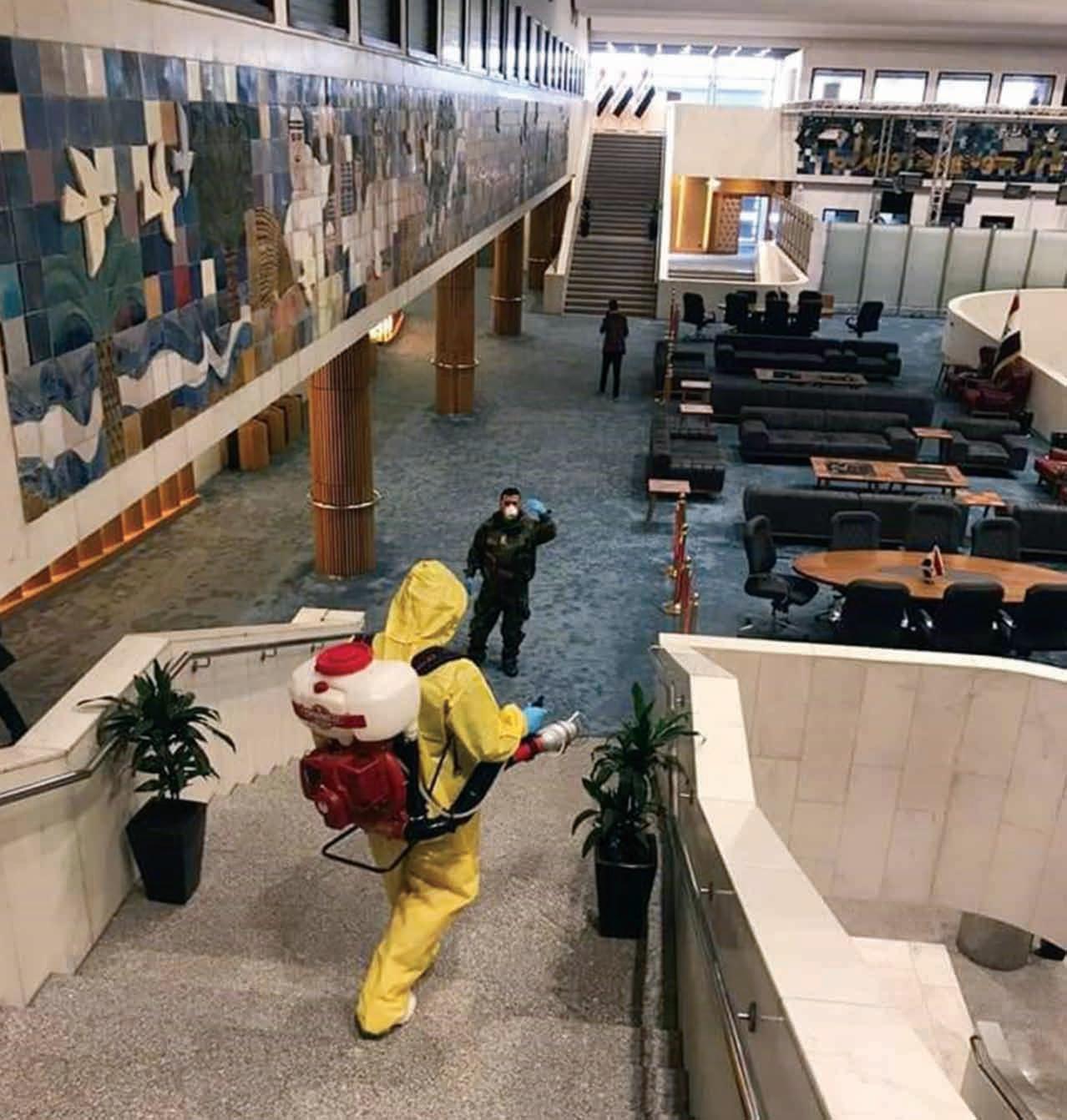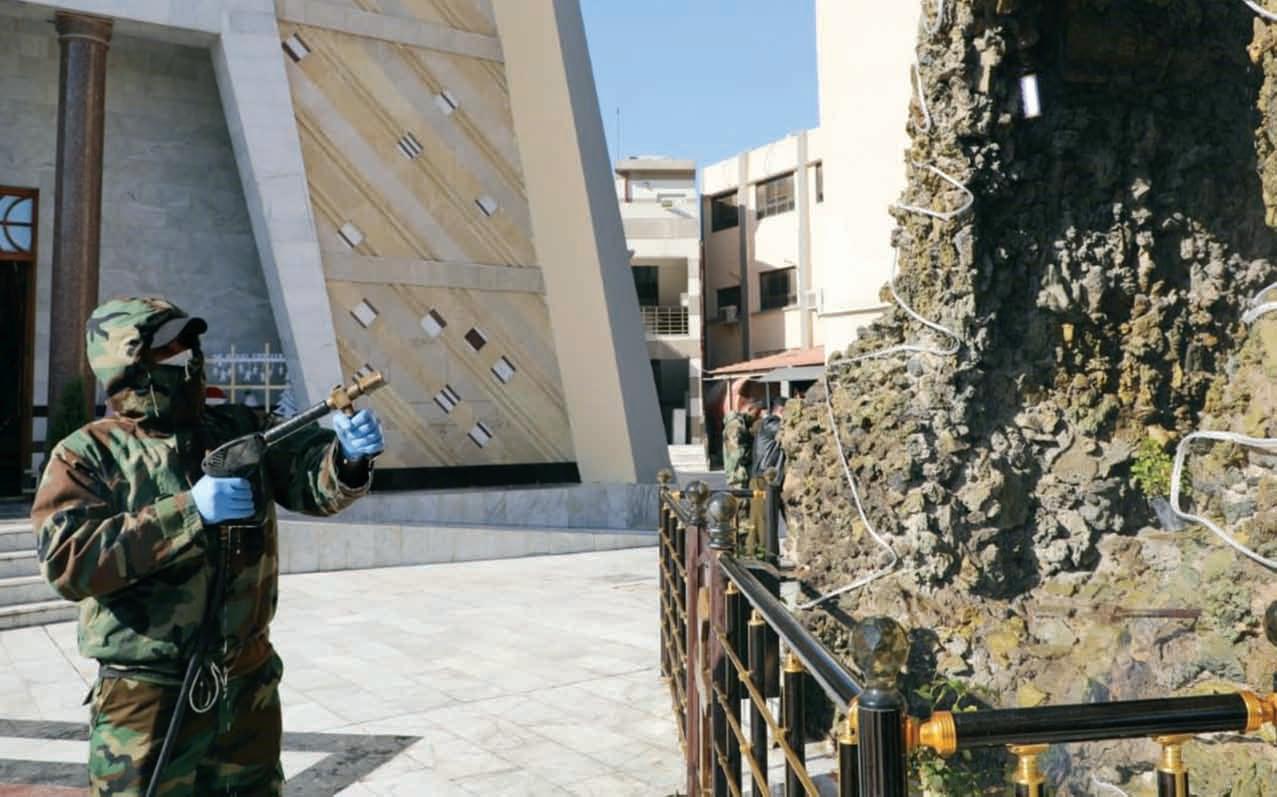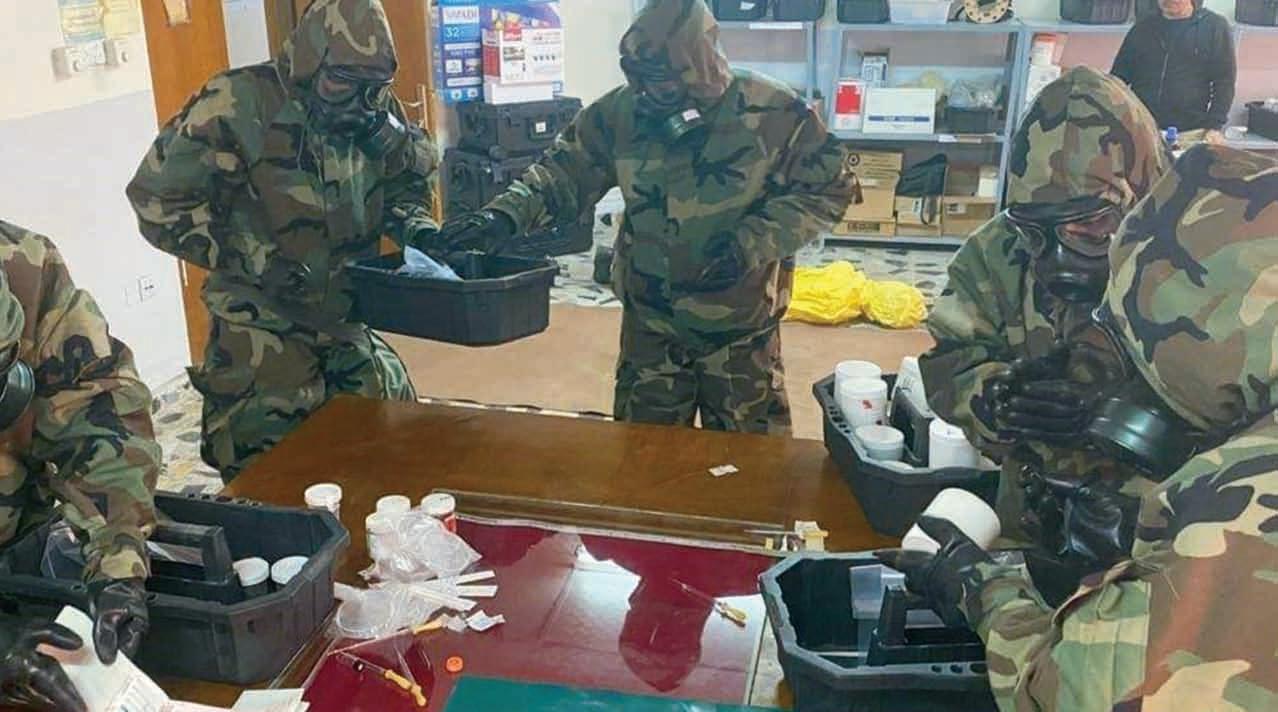
13 minute read
Building out
Shawn BakerGarcia, CEO of The Critical Mass, talks to Gwyn Winfield about taking the conference to new heights
Dr Falah Hussein of Babylon University is perhaps the most visible of the national organisers of the CBRN Safety and Security Conference in Iraq, but behind the scenes (and sometimes up front) is Shawn Baker-Garcia. Ms BakerGarcia has been supporting the event since its inception, first via the state department, then the Defense Threat Reduction Agency (DTRA), and now through The Critical Mass (TCM).
Advertisement
Her involvement dates back to 2012, when she was based in Iraq as part of the Cooperative Threat Reduction (CTR) office at the State Department. Ms BakerGarcia explained: “I first encountered Dr Falah in 2011, at a meeting in Amman where we were working together to reactivate the Iraq Chemical Society. He had a clear grasp of what was important and was very practical. He has this ability to speak truth to power; and as a professor it is amazing how many people have sat in his classes! By 2014 I had just returned from two years in Iraq, where I had been deployed to Baghdad to oversee the chem and bio portfolios of CTR. Pretty soon, other U.S. agencies realised: ‘We've got this person in Baghdad who seems to understand CBRN!’ I ended up being a gateway for some of them to get information about what they were trying to accomplish in their CBRN programmes.
“That's when I met Dr Mohammed Sharaa, who was then director general of the Iraq National Monitoring Authority, the national compliance authority for international regimes and treaties pertinent to nonproliferation. The three of us were well connected throughout Iraqi and U.S. networks. In 2015 we reviewed incoming proposals and ideas for Iraq, and the Iraqis actually came to us suggesting a conference. Dr Falah and I had kept in touch over the years, and we cultivated this idea and Dr. Sharaa agreed: ‘We should do this!’ We then oversaw the inaugural conference and with all our contacts we drew the cream of the Iraq CBRN crop to attend. I left the State Department knowing they still had an Iraq programme, but felt pretty good
about it, and went to support Oak Ridge’s DoD CBRN nonproliferation programme for Iraq. While there I developed a national chemical security framework assessment for Iraq, jointly with Pacific Northwest National Laboratories, working with Dr Kabrena Rodda who was one of our esteemed key notes for this latest conference.
“The conference dropped off the radar for the State Department and DoD funding that year, and the Iraqis did it on their own. After that, DTRA got involved for several years, up to and including 2020.
“In 2019 the conference was socialised around DTRA via its proliferation prevention programme. They thought it was a good idea and went ahead and funded it. This became the second real job for TCM, and we got a modest amount of funding to help the Iraqis. So we implemented the conference for them, working on the organisation, agenda and speakers. In December 2019, I was in Baghdad for a stakeholder meeting with 35 to 40 Iraqis and talked about internal indigenous subsidisation. They advised that the government of Iraq would put a line item for CBRN into its ministry budgets for the next fiscal year so they would be able to fund the sixth conference, although timing precluded support for the fifth.
“Covid struck out of the blue in February and budgets were redirected accordingly in many cases in Iraq. DTRA seemed to understand that, and was keen to support given the importance of the forum. We were fortunate to have the opportunity to partner with Culmen International under their sponsorship to lend a hand.
“The value I continue to see in this conference is that it yields invaluable information for a fairly low-dollar investment. If you're looking to fund capacity building projects on CBRN security, and you need data to validate or inform your programme design then sponsoring an event like this is a great way to do that. The government of Iraq, gets a platform and a voice to elevate its priorities and concerns over gaps among its leaders. Babylon University has become a vehicle for neutrality.”
Having been personally involved for the past three iterations it is great to see how the audience has broadened, expanding from a (relatively) small group of academics to very nearly a whole of government response. The benefit is that it allows other government departments to see what everyone else is funding, and take a temperature check against them – am I too hot, or too cold? Thanks to the passion of Drs Falah and Sharaa, and the work of Ms Baker-Garcia the University of Babylon is at the centre of it, helping to set the national and regional agenda.
“Babylon University has a great role, and as the CBRN budgets in Iraq are improving, they're starting to get more reliable
Thanks, in part, to the conference there has been an increase in CBRN funding ©Civil Defence
funding so they can do this indigenously. It’s still important that donor nations who care about these issues should continue to support even if it’s just covering the costs of this year's tote bags. It all helps to buy a seat at the table and make for a genuine multilateral cost share. We've shown we can pull in top level international expertise, from Pakistan, Georgia and Jordan. This was a great way to take the first step towards creating a macro-community, and facilitating connectivity and information sharing.”
It is obviously desirable to have greater multi-national support, whether from the US, Europe or NATO, but one of the advantages of having a single sponsor is the clarity of message. The return on a “low-dollar investment” has meant that Iraq has benefitted from one clear voice. As the event builds in the region, and attracts greater attention, diverse and conflicting opinions and priorities may present an emerging challenge. Europe might want to deliver capability one way, while the US prefers another. Odds are if they can’t agree, they’ll end up trying to deliver both and split the national effort into competing camps which decreases the focus on. national capability building. Ms Baker-Garcia admitted that it is difficult to balance all this, but that didn’t mean don’t try. “You've got governments who care about these issues, albeit with their own reasons for working together. Underneath that are operators who are either active government or private sector, and understand what the top VIPs in the Iraqi government care about. So you can have multiple donors, and it will come down to the operators who care about Iraq and ensure that funding stays and doesn’t become a momentary phenomenon. It can get messy, especially with too many cooks in the kitchen at the operator level. You can never have too many Iraqi ministries or other governments interested, it is all very manageable as long as there are clear rules and responsibilities which are enforced at all levels.”
Success in bringing all these national and international agencies together has its own challenges. Once problems are released and donors found, what is working needs to be updated constantly, but not in a way that makes things look bad and unnecessarily hurts egos. There can be many reasons why something isn’t working. This conference can and should be at the centre of all things CBRN, ensuring that new approaches to the problems are discussed, teams that can solve them are brought in, and an audience of likeminded people is there to contribute. Ms Baker-Garcia felt confident that the organizing stakeholder team could do it, but admitted it was a challenge.
“This year Dr Falah proved his point. He can throw the world's greatest CBRN conference for Iraq with all the glory that brings. Now he and the organizing committee need to make it more strategic and deliberately designed. A committee should look at Iraq's main CBRN threats or vulnerabilities each year and decide on the priority well in advance. Having a central theme is most productive, is it nuclear energy you care about? Probably not for Iraq, but at some point you have to do something for the radiological experts attending. They probably have issues they are keen to raise.

Dr Falah and the organizing committee need to make the conference more strategic and deliberately designed ©Civil Defence
Conference recommendations must be prioritised to set the stage for next year, whether that’s a quick briefing on progress or the resolution of a specific problem. Without this, there’s a risk of bouncing from problem to problem, because maybe you focused on radioactive waste but next year Daesh is back and doing CW. There has to be a strategy for the conference that stops it from being purely reactive.”
Ms Baker-Garcia also agreed that the “wrap-up” closed conference working group sessions need to be more results driven. This time they came at the end of a long day, and with no deliverables scheduled people felt they could opt in or not. These should be an essential element of the programme and with greater international participation this could be achieved. If the EU, for example, was interested in a particular workshop, and keen to gain greater insight into how it can help develop solutions, then delegates are more likely to be engaged. Ms Baker-Garcia felt that would be a great start and help the drive towards memorandums of cooperation (MOCs). “Both public and private sectors should have a 'roll your sleeves up’ moment and hammer out a framework for an MOC. This can then address some basic points so we can say: ‘One of the conference recommendations is to create an official memorandum of cooperation between these organisations for better cooperation or coordination on chemical security priorities’.
“You won’t get the whole memorandum drafted at that working group, but you could agree on what will be included. Once parties have committed to this MOC it becomes an implicit accountability mechanism because when we get to the sixth conference, we can ask: ‘How's that MOC going? What does it look like and what has been done?’"
To progress these memorandums, or any other codified commitment of cooperation, a comprehensive group of agencies has to attend future conferences, otherwise progress will stall. While most of them do attend, a few are notable either for their absence or low numbers of delegates. Ms BakerGarcia agreed this was so, but stated that the last major standouts had participated this time, and hopefully will be back in greater numbers in future. “We still need, for example, more border security and transportation security people, at either ministry or practical levels. This has proven to be a forum where colleagues from other ministries can acknowledge and agree to increase or improve coordination and communication. This happened during the 5th conference but it was subtle and unless you follow Iraqi stakeholder dynamics you may not have seen it, but there were a couple of these types of exchanges or interactions.
The conference brings stakeholders together and I always advise anybody who’s in this space; try to figure out who impacts a given ministry or individual as no one works in a vacuum. They don't always know who they need…and newcomers to the table always have a massively important role in all this."
Ms Baker-Garcia doesn’t just want more national agencies in the room, but also multinational ones. As recounted elsewhere this magazine, there are many problems still to be overcome in Iraq, some needing advice and others, money. Marrying up the right agencies to do that is vital. “Multinational organisations like the UN and the World Health Organisation (WHO) could be doing more. Many of the Iraqis in the room are agnostic in terms of funding, so hopefully people with certain skill sets, like TCM, can offer ways to work with those people on much needed activities because we can optimise the outcomes.
“They have regular coordination meetings at the super high level where everybody comes and talks, or at least they did before Covid, but these are disconnected from what's happening on the ground and I don't know if they're the best use of resources. In addition you need a lower tier meeting. These are a challenge as they quickly get so big that they’re untenable. You’re giving agenda time for somebody to talk but not to solve problems. What’s needed
is organised groups that will feed information up the chain.
Iraq needs some entity to keep track of the different donor resources that are coming into the country. Recipients don't want to bite the hand that feeds them or disrespect anybody so they’ll accept things even though they don’t integrate with what else they are doing. There’s a lack of transparency about the utility of the aid, so I’d suggest there’s a regional donor/recipient conference where leaders in the field like Drs Falah and Sharaa and their counterparts get together with implementers and the programme-level officers from the funding agencies. The purpose would be a very honest discussion about what's working and what's not in terms of assistance. It’s about getting into a better negotiating position, and being a better advocate for what you need. If you’re offered different detectors to your normal in-service model, maybe it’s because each donor has a different contact in the Iraqi government, and those individuals aren’t sufficiently knowledgeable. They accept what’s offered, not realising that it isn’t particularly useful because perhaps it’s not easily integrated with other existing equipment/ material solution resources, and the donor is not aware of what they have. We need to get donor countries to understand the real requirements to include the user environment context surrounding the requirements, so the recipients get the most out of what they're offered.”
Shawn Baker-Garcia admitted that she is wedded to the Iraqi conference, and the chances of her not being involved in the next iterations are very, very slim. She looks forward to a wider framework for organizing the event, and further coalescing the right people from the relevant agencies in attendance so that some of Iraq’s biggest CBRN problems can be solved. “What gets me excited is the prospect of codifying some of the sustainment elements of the conference. For example, a subsidisation plan, formalising that in 2022 Iraq will ask for 10% external funding, 60% Iraqi funding and 30% commercial – from exhibitors and delegates. Getting that on paper and approved will be a huge step for Iraq and will demonstrate a return on investment for the US government as they will see that Iraq started with no plan or strategy but is now contributing X amount in the next iteration. One aspect is money, the other is people. I would love the Iraqis to build a formal conference committee, an advisory body that is comprised of as many ministries as makes sense with representatives who are part of the annual planning process. This will mean that people and agencies don’t get forgotten, and will encourage project management skills. We pull it off every year but always at the 11th hour! Ideally the approach and what the conference is expected to achieve could be decided much earlier.”
The hope expressed by everyone interviewed for this magazine is that the conference continues to be the transmission belt of interoperability and funding, and that barriers between the operators are broken down, regardless of any infighting at ministerial level. By formulating better, cross-cutting strategies the money that external players invest in Iraq will have both noticeable success in the country, and lateral impact in unexpected places. As the CBRN Conference organizers start planning for 2021 there is little doubt it will be the best yet.

Shawn Baker Garcia is set to be a fixture at future events too! ©Civil Defence










